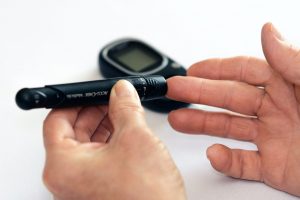 Type 2 diabetes and sleep apnea go hand in hand. Although anyone can develop sleep apnea, obesity is a common contributor. You also have an increased risk of diabetes if you’re overweight. New research has found that diabetes can affect sleep apnea. Fatigue isn’t the only concern of the sleep disorder. It can have potentially life-threatening complications. Here’s what you need to know to sleep peacefully and protect your overall wellness.
Type 2 diabetes and sleep apnea go hand in hand. Although anyone can develop sleep apnea, obesity is a common contributor. You also have an increased risk of diabetes if you’re overweight. New research has found that diabetes can affect sleep apnea. Fatigue isn’t the only concern of the sleep disorder. It can have potentially life-threatening complications. Here’s what you need to know to sleep peacefully and protect your overall wellness.
What is Sleep Apnea?
Obstructive sleep apnea (OSA) is the most prevalent form of the breathing disorder. Frequent breathing disruptions occur while sleeping from the soft tissues in the back of the mouth or your tongue collapsing to block the airway. Each pause in breathing depletes your body of oxygen and interrupts your sleep cycle. With no treatment, you can be at risk of heart disease, depression, sleep deprivation, and diabetic complications.
Link Between Diabetes and Sleep Apnea
Quality sleep is essential for your body to rest and repair. Each stage of the sleep cycle is important for repairing your muscles, memory storage, and cardiovascular health. Your heart rate drops and your blood pressure falls, which are crucial if you have diabetes. You’re twice as likely to be diagnosed with heart disease if you have diabetes.
A good night’s rest also allows your body to regulate hormones, including insulin. Poor sleep quality can increase your risk of insulin resistance. OSA can make it difficult to control your blood glucose.
Sleep deprivation is linked to an unhealthy lifestyle. You might make poor nutrition choices, which can lead to weight gain and cause your blood sugar levels to rise. If your diabetes isn’t controlled, you’ll urinate more often, which pulls water from your tissues. You may wake up to urinate more often during the night, further affecting your sleep quality.
Low blood sugar can also lead to a condition called nocturnal hypoglycemia. You can experience restless sleep, sweating, and nightmares.
Sleep Better and Control Your Diabetes
Besides following your diabetes treatment plan, sleep apnea therapy is equally important. A CPAP is the most common treatment for sleep apnea. A mask is worn over your mouth or nose to deliver air pressure to stop breathing disruptions. However, you might also be a candidate for an oral appliance.
The custom-fit appliance keeps your tongue and jaw in a more comfortable position to prevent an obstruction in the upper airway. It’s effective in treating mild-to-moderate OSA.
You can breathe better and doze off with peace of mind, knowing you’re taking the steps necessary to manage your sleep apnea to support your health and quality of life.
About Dr. Keane Fedosky
Dr. Fedosky earned his dental degree from Baylor College of Dentistry and has continued his education in sleep apnea treatment. He has over 20 years of experience treating obstructive sleep apnea. Dr. Fedosky is a Diplomate of the American Board of Dental Sleep Medicine and many other professional organizations. Request an appointment through his website or call (972) 544-0550.
